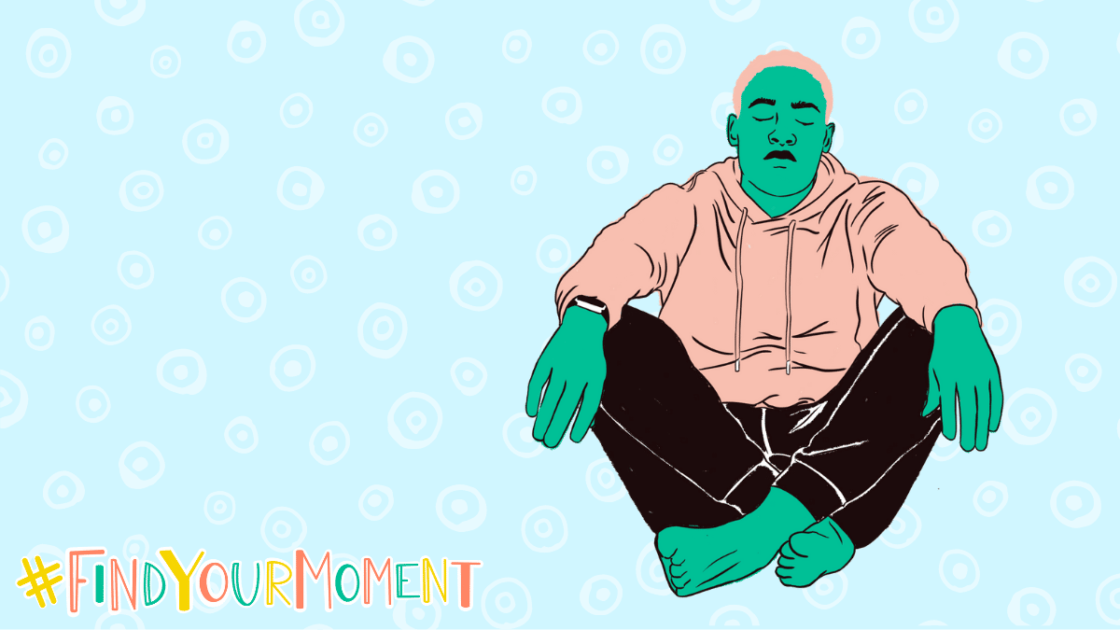What can mindfulness meditation do for your mental health?
Learn what’s involved in mindfulness meditation and how it can help boost your mood, combat stress and improve your wellbeing.

Meditation is a term you probably hear a lot, but you still might not be sure what it means. Misunderstandings are common when it comes to meditation. If you have seen a character on TV meditating by sitting in silence for hours or chanting in difficult yoga poses, you might feel like meditation isn’t something you could do. The truth is that meditation comes in many different shapes and forms, and it doesn’t have to be complicated. You don’t have to spend ages meditating for it to work and you don’t have to sit still while doing it. It’s a much more flexible tool than you might think.
What is meditation?
You can think of meditation as a set of techniques and mental exercises that help you to change your awareness and focus your attention in different ways. Meditation has been practised in a variety of forms for thousands of years and it features in many cultural and religious traditions. While meditation was historically used for spiritual reasons, many people today also use meditation techniques to support their mental health and wellbeing in a non-religious context.
Meditation and mindfulness
One of the most common ways that people use meditation to improve their wellbeing is by practising mindfulness. Mindfulness is the ability to be aware of what’s happening in the present moment, both inside of your body and in the world around you. It’s a common myth that mindfulness is about clearing your head or trying to turn off your thoughts or feelings. Mindfulness actually encourages you to be aware of your thoughts and feelings without judging them and without getting lost in them. This can help you gain healthier perspectives and, over time, a deeper understanding of yourself. You don’t need to change who you are as a person to practice mindfulness.
What is involved in mindfulness meditation?
While meditation comes in many different shapes and forms, they all share some common features. Some of these features are listed below:
Focused attention
Learning to focus your attention on specific things is an important part of meditation. Some techniques encourage you to focus on a particular word or phrase, while others focus on your senses or even your breathing. In mindfulness meditation, the goal is to focus your attention on the present moment, instead of focusing on the past or the future. This can be tricky at first but gets easier with practice. Sometimes it helps to think of mindfulness as bringing awareness to what’s going on in the world outside your head.
Relaxed breathing
Breathing techniques are at the heart of meditation practices. Focusing on your breath while breathing deeply and evenly can help relax your body and quiet your mind. If you have issues with your breathing, breathing in or out for set times can be challenging, but this doesn’t mean that you can’t practice mindfulness meditation. You can still focus attention on your breath while breathing in whatever way is comfortable and natural for you. Avoid fast, deep breathing, as it can make you feel more nervous. If you tend to get anxious when focusing on your breath, try focusing on something else instead, such as the sounds around you.
Open and kind attitude
Mindfulness works best when you practice with an open and accepting attitude. You are encouraged to notice your thoughts and surroundings without judgement. The goal is to accept yourself as you are rather than criticising yourself. Mindfulness encourages you to experience without judgement and to respond with kindness, both towards others and towards yourself. Treat yourself as a good friend would treat you. We tend to criticise ourselves harshly for our mistakes and perceived failures, but taking a friendly attitude towards ourselves has been shown to improve our long-term wellbeing.
What can mindfulness meditation help with?
There isn’t a right or wrong way to meditate. If you want to try out mindfulness meditation, explore different techniques and find an approach that you enjoy and that meets your needs. Taking part in a mindfulness meditation exercise for ten minutes a day can be very good for your emotional wellbeing. If you’re not sure where to start, first ask yourself what you would like to get out of meditation. Meditation can do much more than help you relax. Research has found that mindfulness meditation can have a wide number of benefits for mental wellbeing. Here are some ways people find meditation helpful:
Mindful meditating to boost your mood
Many people notice an improvement in their general mood when they practice mindfulness. Research has found that mindfulness meditation can improve low mood, reduce negative thoughts, and lead to a more positive outlook on life. Studies have also found that practising mindfulness meditation can make you happier and help you to be kinder towards yourself.
Meditating to manage stress
Research shows that mindfulness meditation can help with managing daily stresses. Stress affects your body physically in several ways. Your heart rate increases, your muscles tighten, and your breathing can become fast and shallow. If you’re going through a stressful period, you can be unaware of the amount of physical tension you’re carrying. Taking a few minutes each day to pause, focus on your breathing, and relax your body can make a big difference. Practising mindfulness meditation regularly can help you recognise the signs of stress early and provides tools to manage it more effectively.
Meditating to stop overthinking
Mindfulness meditation teaches you how to spend less time thinking about the past or the future, and instead, focus on the present moment. This can be helpful if you are struggling with overthinking. Continuously thinking the same thoughts that are contributing to feeling upset or worried is called rumination. Research shows that practising mindfulness meditation is an effective way to reduce rumination and boost wellbeing. This is because it helps you recognise when you’re ruminating, allowing you to step out of it. Breaking the cycle of rumination can greatly benefit your mental health. Remember, rumination happens inside your head, so shifting your focus to the outside world can be an effective way to disrupt the chain of negative thoughts.
Meditating to get better sleep
If you struggle to get enough good sleep, you’re not alone. Insomnia and low quality sleep can harm your mental health and wellbeing. Research has found that practising mindfulness meditation regularly can lead to longer and better quality sleep. If you are often kept awake with racing thoughts, mindfulness meditation can help you refocus your attention on the present. It can also get you ready for a good night’s sleep by relaxing your body, lowering your heart rate, and slowing your breathing.
Meditating to help focus
Research has found that regularly practising mindfulness meditation can improve your focus and attention. It can also improve your memory and mental problem-solving ability. You can think of meditation as a training exercise for your mind. Lots of people find that practising meditation makes concentrating easier and gives them a longer attention span.
How can I try out meditation myself?
One of the good things about mindfulness meditation is how easy it is to try for yourself. Start with small, simple exercises and gradually build up over time. Keep in mind that there’s no perfect way to meditate and it’s not something you can fail at. If you decide to embark on your own mindfulness meditation journey, don’t feel discouraged if you don’t notice results right away. Meditation is a skill and it takes some practice. The more you practice, the better you will get. It can be tricky at first and it works best when you do it consistently. Remember to go at your own pace and don’t be too hard on yourself.
What if meditation is not for you?
The way meditation is discussed can sometimes make it sound like the cure for everything. In reality, not everyone has a good experience with meditation. If you try meditation and it doesn’t have a positive impact on your life or if you simply don’t like it, that’s ok. It doesn’t mean that you’re doing it wrong or that there’s something wrong with you. Meditation is just one of many ways that people support their mental wellbeing. There are lots of other ways in which you can practise self-care, look after yourself, and support your mental health.
Feeling overwhelmed and want to talk to someone?
- Get anonymous support 24/7 with our text message support service
- Connect with a trained volunteer who will listen to you, and help you to move forward feeling better
- Whatsapp us now or free-text SPUNOUT to 50808 to begin.
- Find out more about our text message support service
If you are a customer of the 48 or An Post network or cannot get through using the ‘50808’ short code please text HELLO to 086 1800 280 (standard message rates may apply). Some smaller networks do not support short codes like ‘50808’.






